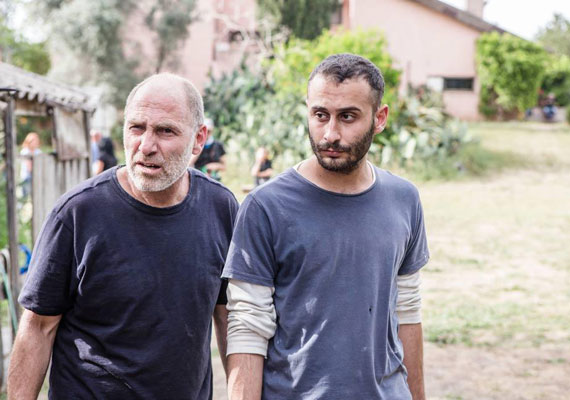The Cousin: Love thy neighbour
by Marta Bałaga
- VENICE 2017: Written and directed by Israeli actor Tzahi Grad, the film tackles the never-ending conflict that literally reaches one’s doorstep

Naftali (Tzahi Grad) is a local celebrity eyeing up an ambitious new project. When he decides to finally complete some long-delayed work on his studio, he hires a Palestinian worker, who doesn’t show up, sending Fahed instead (Ala Dakka, from Beyond the Mountains and Hills [+see also:
trailer
film profile]). Although his new handyman doesn’t seem to know all that much about what needs to be done, for a while everything goes well – until somebody assaults a girl in the neighbourhood and the Israeli community of the close-knit village quickly turns against the stranger, forcing Naftali to finally pick a side.
“We are all racists. The question is whether you give into that or not,” states Tzahi Grad rather cynically in The Cousin [+see also:
trailer
interview: Tzahi Grad
film profile], which he wrote, directed and stars in, and which has just premiered in the Venice Film Festival’s Orizzonti. Still best known for his role in 2013’s Big Bad Wolves, he once again turns his attention to a story about trying to take justice into one’s own hands. But this time around, the mood is much lighter, even though the humour frequently veers into the pitch-black.
For all the social critique implied here, Grad does seem to enjoy a good ribbing. Especially at the expense of Naftali himself, a left-wing idealist who, after stressing the need to understand both sides of the conflict, suddenly ends up following through with what he has been preaching. Predictably, all that talk doesn’t necessarily translate into action – although convinced of Fahed’s innocence, Naftali quickly starts questioning his own stance, especially when it becomes painfully apparent that when faced with bored wannabe vigilantes who would gladly engage in some tarring and feathering just in time for dinner, it would be so much easier to simply turn a blind eye.
The idea of mirroring a large-scale conflict in a small environment is as practical (Grad shot most of the film in his own house) as it is effective, and as proven by recent nominations for the Ophir Awards (given out by the Israeli Academy of Film and Television), there is clearly a need for this type of confrontational cinema. But one can’t help but wish that Grad would preach his message with just a touch more subtlety: old grudges and deeply rooted biases notwithstanding, it all escalates a bit too conveniently – and quickly – to fully convince, all the while exuding a slight TV feel. Still, for a film devoted to a very specific conflict, The Cousin proves surprisingly universal. Which, come to think of it, is also extremely upsetting.
The Cousin was produced by Israel’s Mh1 and US outfit Bleiberg Entertainment, which also handles its international sales.
Did you enjoy reading this article? Please subscribe to our newsletter to receive more stories like this directly in your inbox.



















